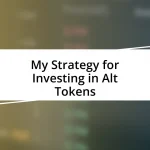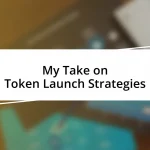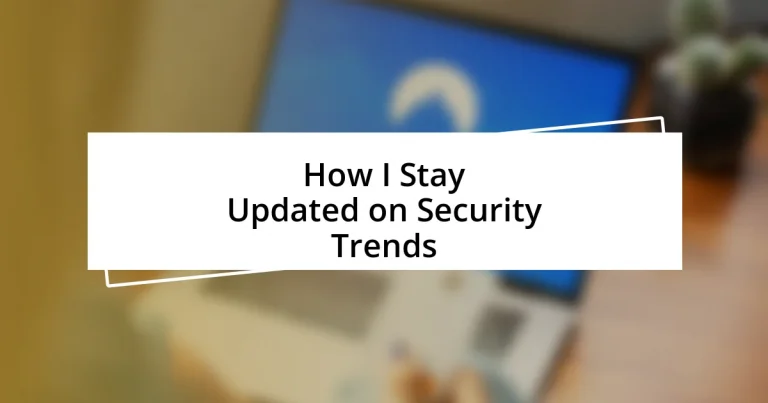Key takeaways:
- Understanding security trends is essential for recognizing vulnerabilities and fostering proactive discussions among colleagues.
- Identifying reliable information sources, such as industry blogs and academic journals, enhances knowledge while maintaining a critical perspective on cybersecurity information.
- Engaging in online security communities and continuous learning strategies, including attending webinars and organizing discussions, builds collective knowledge and strengthens individual security practices.
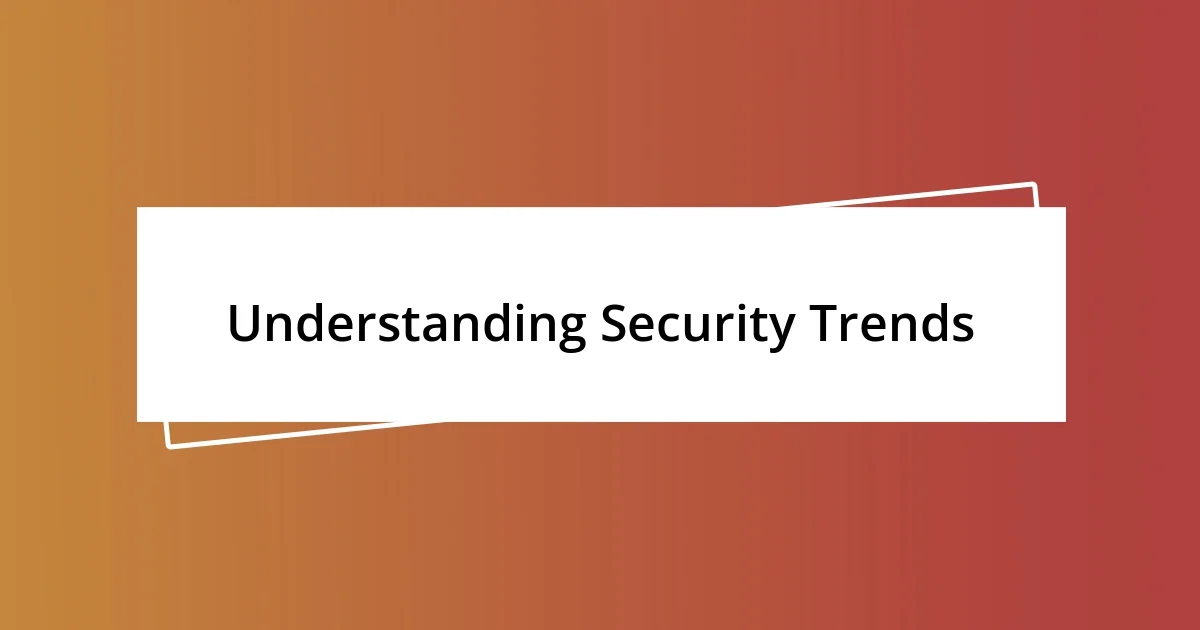
Understanding Security Trends
Understanding security trends is crucial because the landscape is continuously evolving. I remember when I first encountered a significant data breach at my workplace; it opened my eyes to how vulnerable we all can be. Every incident serves as a reminder that staying informed is not just an option—it’s a necessity.
I often ponder why certain security trends emerge more prominently than others. For instance, the rise in ransomware attacks has been alarming. Reflecting on this, I realized that the surge can often correlate with the increasing digitization of our personal and professional lives. It’s fascinating how the interconnectivity we value comes with its own set of risks.
In my experience, understanding these trends goes beyond just knowing the facts. It’s about recognizing their impact on our daily lives. I frequently find myself engaging with colleagues about how these trends affect their work, sparking insightful discussions on proactive measures. Isn’t it empowering to know that being aware can help us create safer environments?

Identifying Reliable Information Sources
Identifying reliable sources is an art that requires a discerning eye and a healthy dose of skepticism. I often find myself sifting through various outlets, looking for credibility before diving into what’s being offered. For example, when I read a blog post about the latest phishing tactics, I check the author’s background, ensuring they’re not just another voice in the crowded online space.
To help filter out the noise, here are some reliable sources I turn to regularly:
- Industry Blogs and Websites: I often read posts from established cybersecurity firms and thought leaders. Their expertise ensures I’m getting accurate information.
- Government Agencies: Websites like CISA and FBI provide invaluable resources on current threats and prevention strategies.
- Academic Journals: I delve into scholarly articles that offer in-depth research, which helps me understand trends from an analytical perspective.
- Webinars and Conferences: I make it a point to attend events where experts discuss cutting-edge security trends; the direct engagement adds a layer of insight I often appreciate.
- News Outlets with Specialization: Certain publications focus exclusively on technology and cybersecurity, offering thorough analyses that I trust.
With every source I explore, I also consider the timeliness of the information. Cybersecurity is fast-paced; sometimes, what was true last month may no longer be relevant today. This is why I find myself always double-checking facts against multiple sources before forming an opinion.
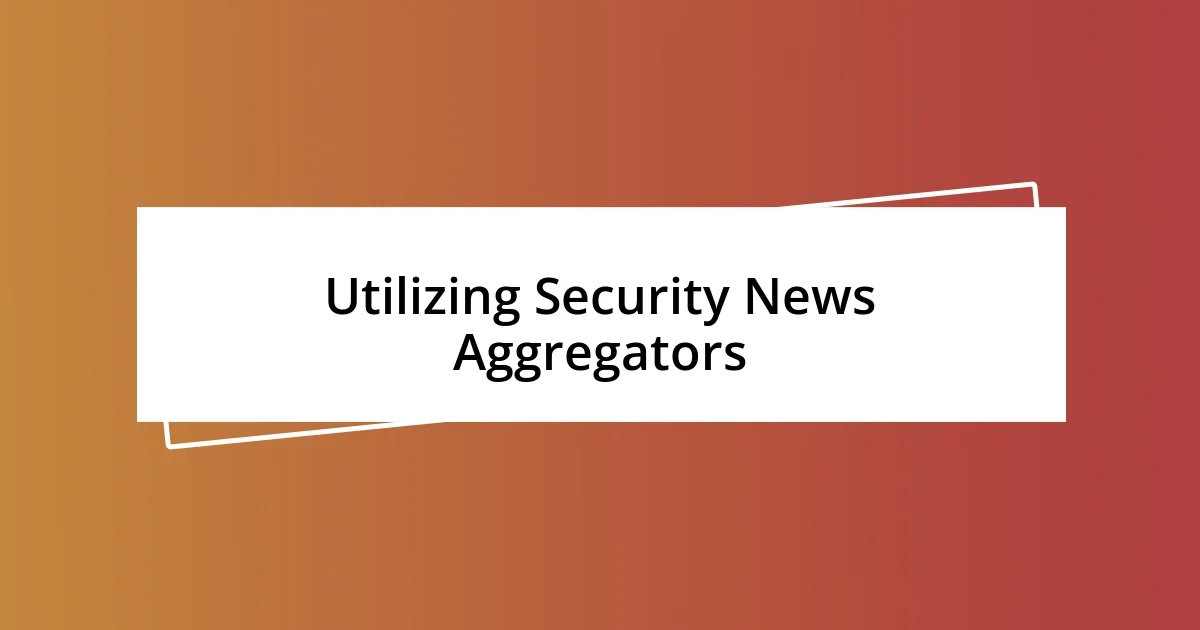
Utilizing Security News Aggregators
Utilizing security news aggregators has been a game-changer for me. Whenever I check my aggregator, I’m often greeted with a curated selection of the latest security news from various trusted sources. This saves me time and ensures I don’t miss important updates. There was a time when I relied solely on individual websites, but I quickly realized how overwhelming that approach could be. Having key updates delivered in one place allows for a more streamlined experience, making it much easier for me to stay vigilant.
One of my go-to platforms is Feedly, which allows me to customize the topics I follow, ensuring I receive relevant content without the clutter. I remember one day I glanced through my feed and came across a story about a new phishing scheme targeting financial institutions. Because I had that knowledge, I could proactively advise a colleague who was in the middle of a client project. It’s moments like these that reinforce my belief in the power of aggregators: they don’t just tell me what’s happening; they equip me to act on that information.
In my experience, these aggregators are useful for staying informed, but they also come with a caveat. The volume of information can be overwhelming, making it easy to overlook significant developments. This is why I make it a habit to schedule time each week dedicated to reviewing my aggregator feed. By doing this, I can thoroughly digest the information and reflect on how it might impact my work and security practices moving forward.
| News Aggregator | Key Features |
|---|---|
| Feedly | Customizable topics, clean interface |
| Google News | Wide-ranging news sources, easy access |
| Inoreader | Advanced search, filtering options |
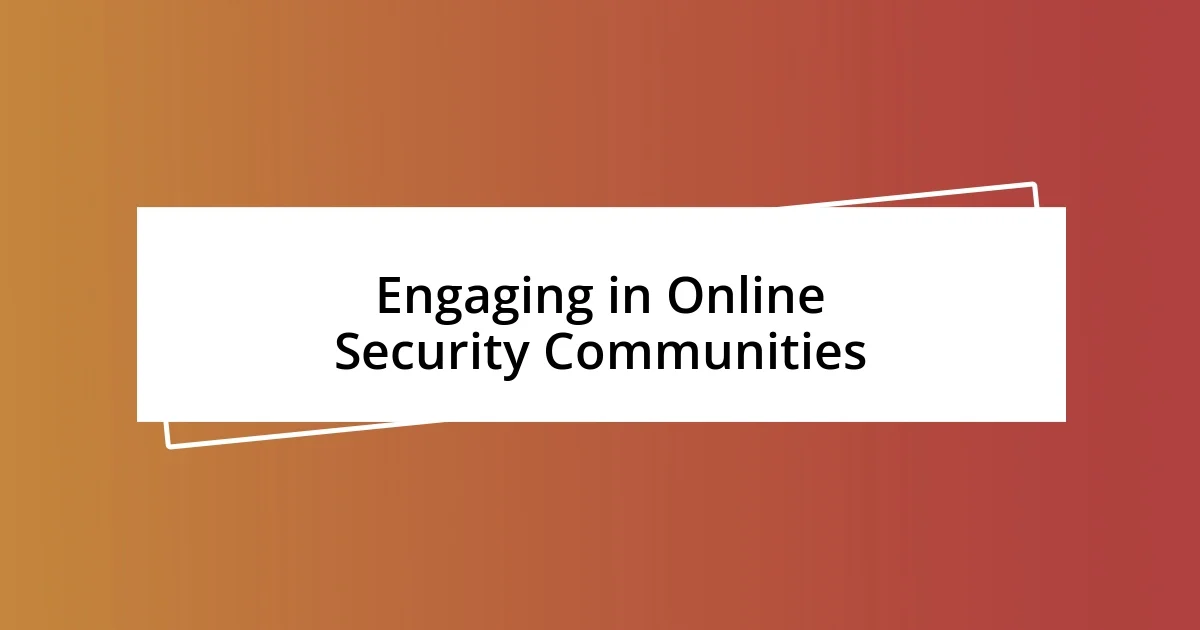
Engaging in Online Security Communities
Engaging in online security communities has significantly enriched my understanding of the field. Participating in forums like Reddit or specialized Discord channels allows me to tap into collective knowledge and share experiences with peers. I remember a time when I found a thread discussing recent ransomware attacks; the insights shared by members were both alarming and enlightening, prompting me to implement new security measures in my own environment. Have you ever joined a community where the shared experiences helped you navigate a complex issue?
I also appreciate the value of networking within these communities. Connecting with experts and fellow enthusiasts fosters an environment where real-time discussions happen about emerging threats. I once attended a live Q&A session with a known security researcher, and their perspectives on social engineering tactics opened my eyes to vulnerabilities I hadn’t considered in my everyday practices. This direct interaction gives me the confidence to ask questions I might shy away from otherwise. Isn’t it empowering to learn from those who actively study and mitigate these risks?
Moreover, I often find support and encouragement in these online spaces, especially when I face daunting security challenges. There’s something comforting about knowing that my concerns resonate with others, and I can swap stories or seek advice on the community’s channels. For instance, after I shared my experiences with a phishing attempt, several members chimed in with their tales and strategies to combat such threats. It made me realize that we’re stronger together, tackling security challenges as a united front. Isn’t it amazing how communal knowledge can transform individual experiences into collective wisdom?
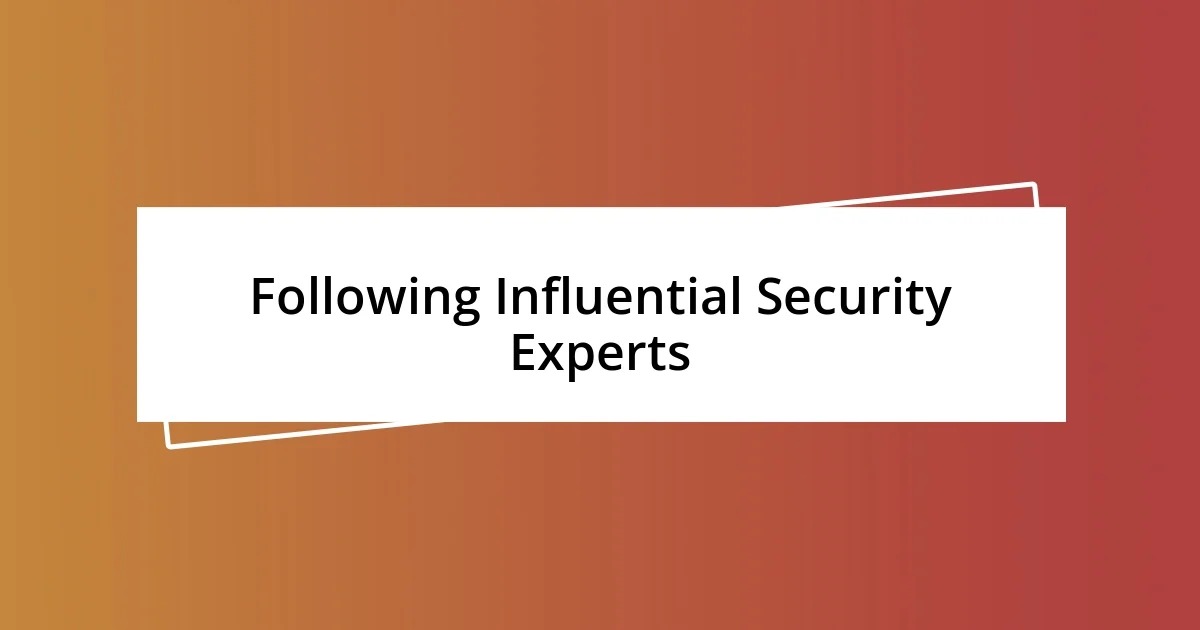
Following Influential Security Experts
Following influential security experts has been a cornerstone of my strategy for staying ahead in this ever-evolving field. I have found that their insights into emerging threats often shape my own understanding and actions. For instance, I once attended a webinar featuring a prominent expert discussing the nuances of threat intelligence. Their take on the importance of real-time data collection resonated with me, leading me to revamp my own data monitoring practices. Have you ever pondered how expert insights could transform your security approach?
I also rely on social media platforms like Twitter to follow these experts. It’s fascinating how a single tweet can encapsulate critical information in a matter of seconds. One day, I saw a quick post from a well-known security analyst about a zero-day vulnerability. That brief notice sparked immediate action on my part, prompting me to audit my systems. Isn’t it incredible how easily accessible some of the most profound knowledge is?
Moreover, I enjoy engaging with security podcasts hosted by these industry leaders. Listening to their discussions while I commute has become a routine part of my week. There’s something about hearing their voices and personal stories that brings the information to life. I vividly remember a podcast episode where a leading security researcher recounted their own experiences with a major data breach. Their honesty about the emotional toll it took on their team reshaped my perspective on the human side of cybersecurity. Have you ever considered how these narratives could enhance your understanding of the risks we face?
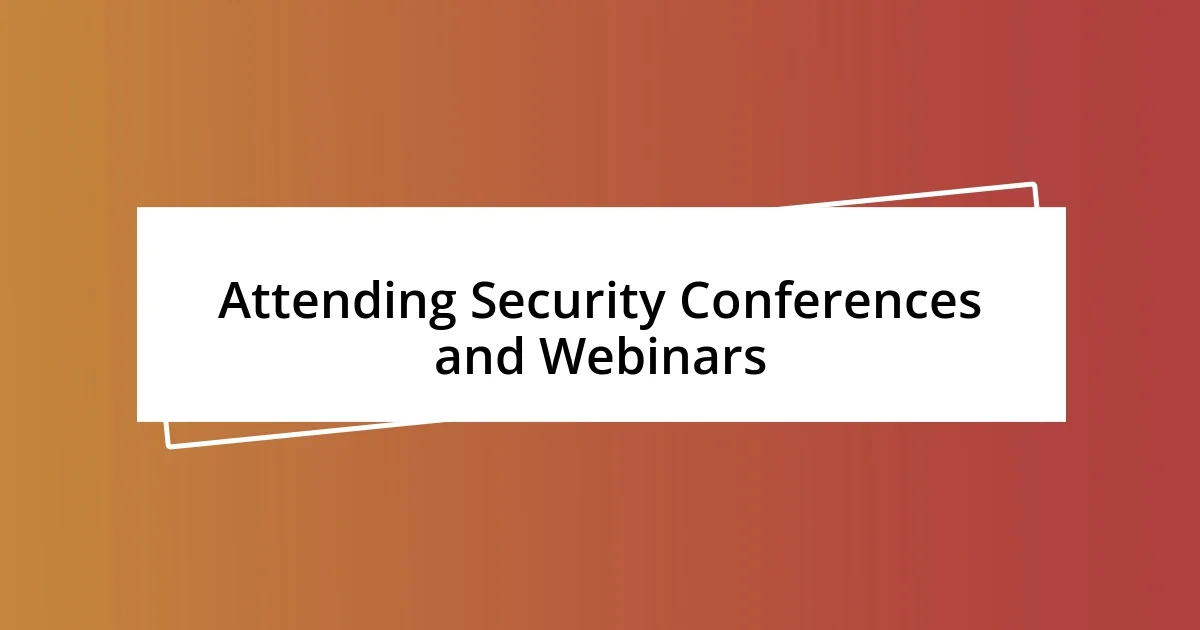
Attending Security Conferences and Webinars
Attending security conferences and webinars has profoundly impacted my understanding of current trends and challenges. I vividly remember the first conference I attended; being immersed in discussions with industry leaders was both exhilarating and humbling. The insights I gained during breakout sessions helped me rethink my approach to endpoint security. Have you ever experienced that rush of inspiration when you learn something new from experts in real-time?
Webinars also serve as an invaluable resource, especially for those of us balancing busy schedules. Just last month, I participated in an online session focused on securing remote work environments. The presenter shared alarming statistics about the rise of home network vulnerabilities that struck a chord with me. It wasn’t just about the facts; it was about how I could actively apply those lessons to improve my own security posture. Isn’t it incredible how accessible knowledge can drive immediate change?
Moreover, the networking opportunities at these events shouldn’t be underestimated. I recall striking up a conversation with a fellow attendee who specialized in incident response. Our dialogue revealed a shared concern about the growing sophistication of phishing attacks. This interaction led me to explore new tools and resources I hadn’t previously considered. Have you thought about how a simple conversation could spark ideas that transform your security strategies?
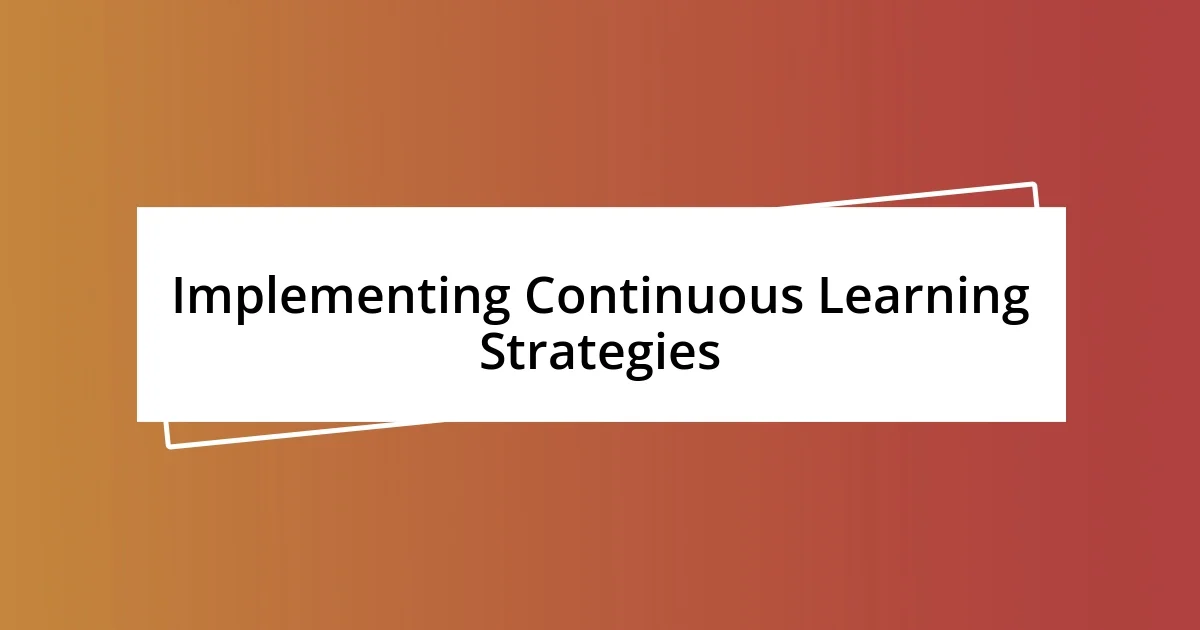
Implementing Continuous Learning Strategies
Implementing continuous learning strategies has been crucial for my growth in the security field. I often set aside dedicated time each week to dive into the latest research papers or case studies. Just recently, I stumbled upon a comprehensive study regarding the impact of AI on threat detection. The findings were enlightening and spurred me to experiment with integrating AI tools into my own security operations. Have you ever found that a single report or study opened doors to new ideas for you?
Incorporating learning into everyday routines can also enhance retention and engagement. For example, I started following online courses that focus on niche security topics, which I tackle during my lunch breaks. One course on data encryption truly reshaped my understanding of how vulnerable sensitive information can be when transported across networks. It was an eye-opener that made me reevaluate our own encryption practices. Doesn’t it feel empowering to equip yourself with knowledge that directly influences your professional responsibilities?
Additionally, I believe in the power of collaboration and knowledge sharing among peers. I organize a monthly book club with colleagues where we discuss the latest security literature. A particular meeting where we explored the principles of cognitive security had a profound impact on our team dynamics. Together, we brainstormed effective ways to foster a security-conscious culture within our organization. Have you considered how collaborative learning can elevate not just your knowledge, but also the capabilities of those around you?







